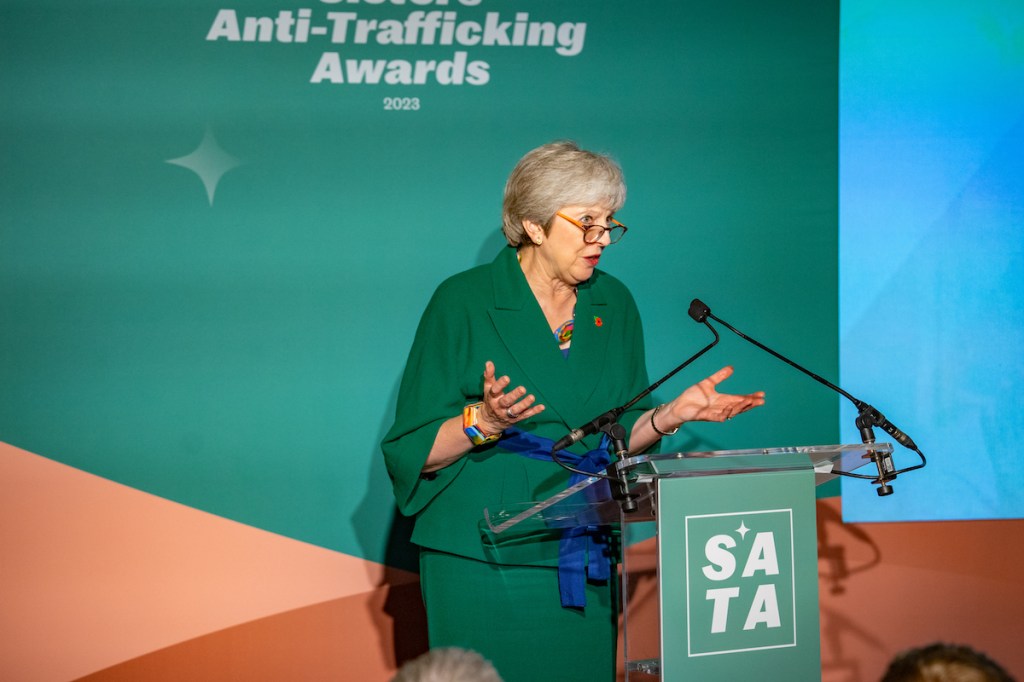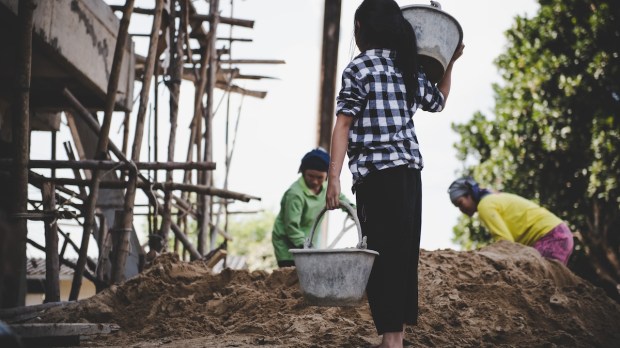Theresa May, the former British prime minister, and British champion athlete Sir Mo Farah paid tribute to three Catholic sisters at a ceremony in London on Tuesday night, shining a spotlight on the work women religious do to combat human trafficking.
In the inaugural Sisters Anti-Trafficking Awards (SATA), consecrated women from India, Nigeria, and Thailand were recognized for their work rescuing women from networks that profit from sexual and labor trafficking.
A consortium presenting the awards spoke of the “exceptional contribution of Catholic sisters to the anti-trafficking movement.”
The honorees – Sr. Seli Thomas, SMI, from India, Sr. Patricia Ebegbulem, SSL, from Nigeria and Sr. Francoise Jiranonda, SPC, from Thailand – “have demonstrated courage, creativity, collaboration, and achievement in the protection of their communities from human trafficking,” said the hosts of the event.
That consortium consists of Arise, an anti-slavery NGO working across the world to protect communities from exploitation; the International Union of Superiors General, a group of female Superiors General that established and supports Talitha Kum, a network of religious sisters against human trafficking; and the Conrad N. Hilton Foundation, established by the international hotelier in 1944.
They pointed out that Catholic sisters are motivated by a “foundational belief in the dignity of every person and service of the Common Good.”
“Sisters are often uniquely positioned in remote areas, otherwise out of reach,” SATA press materials said. “They are embedded in and trusted by their communities – key to effective anti-trafficking work.”
While human trafficking is a “networked crime,” SATA said, Catholic sisters “meet the need for networks [to respond] to an exceptional degree, as part of congregations and the global Catholic community.”
Farah, a Muslim from Somalia, who himself was trafficked as a child, commented, “While many people feel powerless against this crime and look the other way, Catholic sisters are doing the work daily, bravely, humbly, across the communities all over the world. Whatever faith or values we hold, we can all look to those women for wisdom and inspiration.”
The honorees
Sr. Seli Thomas, a member of the Sisters of Mary Immaculate in Krishnangar, West Bengal, India, has helped rescue exploited girls and prosecute traffickers. She focuses on education of youth in a brother district, providing awareness programs and “a space where they can come and talk to us.” She provides free legal aid and jobs for women, so that their poverty won’t leave them open to exploitation.
Like Sr. Seli, Sr. Francoise Jiranonda, a member of the Sisters of St. Paul of Chartres, believes that education is vital in helping to keep young people from being trafficked. Based in Bangkok, Thailand, she runs the Princess Ubolratana School and the St. Joseph Mae-Chaem School. She also works with the Karen people in remote areas, teaches young women vocational skills for free after high school, and was instrumental in bringing Talitha Kum to Thailand, a major origin and destination for human trafficking in Asia.
Sr. Patricia Ebegbulem, of the Sisters of St. Louis in Lagos, Nigeria, has been working against human trafficking for more than two decades. She was instrumental in establishing Bakhita Villa, named for the Sudanese slave who became St. Josephine Bakhita. It’s a shelter providing rehabilitation and reintegration support to survivors of trafficking. She runs mass awareness programs across high-risk rural areas and schools, works to provide education and employment in order to help keep young people safer from trafficking, and is a national leader on the issue of trafficking.
“Stopping human trafficking is an uphill task, but I will not say it is impossible,” she said, “because with God, nothing is impossible.”

“Local groups are key to eradicating slavery,” said former Prime Minister May. “Sisters can spot those vulnerable to risk, and can help rebuild the lives of those affected.”



